Mathematical concepts are important for everyday life. They develop slowly and over time in young children. Children need lots of opportunities to experience mathematics in a variety of different contexts. The outdoor environment is a wonderful space for children to explore number, shape, space, size, quantity, relationships, pattern, sequencing and time.
A sample of Maths Learning Intentions that are easily provided outdoors
· - Develop an understanding of one-to-one correspondence
- Recognise numbers to at least 20
- Find an object of similar length, weight, capacity and area
- Explore the differences in length, weight, capacity, shape and size
- Begin to measure using non-standard units
- Build and make models with 3D shapes
- Talk about the properties of 3-D and 2-D shapes using appropriate mathematical language
- Sort collections of shapes in several ways; describe the arrangements
- Be involved in solving practical problems
Some experiences that will support children's understanding of early mathematical concepts
Experiment with volume and capacity – children love to fill and empty containers with sand, stones, water, leaves, etc. This is their way of getting to grips with what is full, empty, half full, overflowing and so on. They will compare which is heaviest, lightest, heavier than, lighter than, the same as … Younger children might simply want to drop items into containers, listen to the sounds and then tip them out again. Questions that children might ask include; Why is that jar heavier? What makes the plank tip? Why is it not tipping? I have 5 plastic bottles on the left side and 5 plastic bottles on the right side, but the plank tipped on the right side! This becomes a real area for investigation that children should be allowed to work out for themselves. Sometimes adults intervene too soon. The children will come up with possibilities; perhaps some bottles are not quite full, or perhaps the pivot is not in the middle of the plank. Simple equipment such as a tyre or block acting as a pivot, with a plank on top can perform very well as a balance. Children will spend hours investigating and learning at this simple piece of equipment which is low cost or no cost at all!
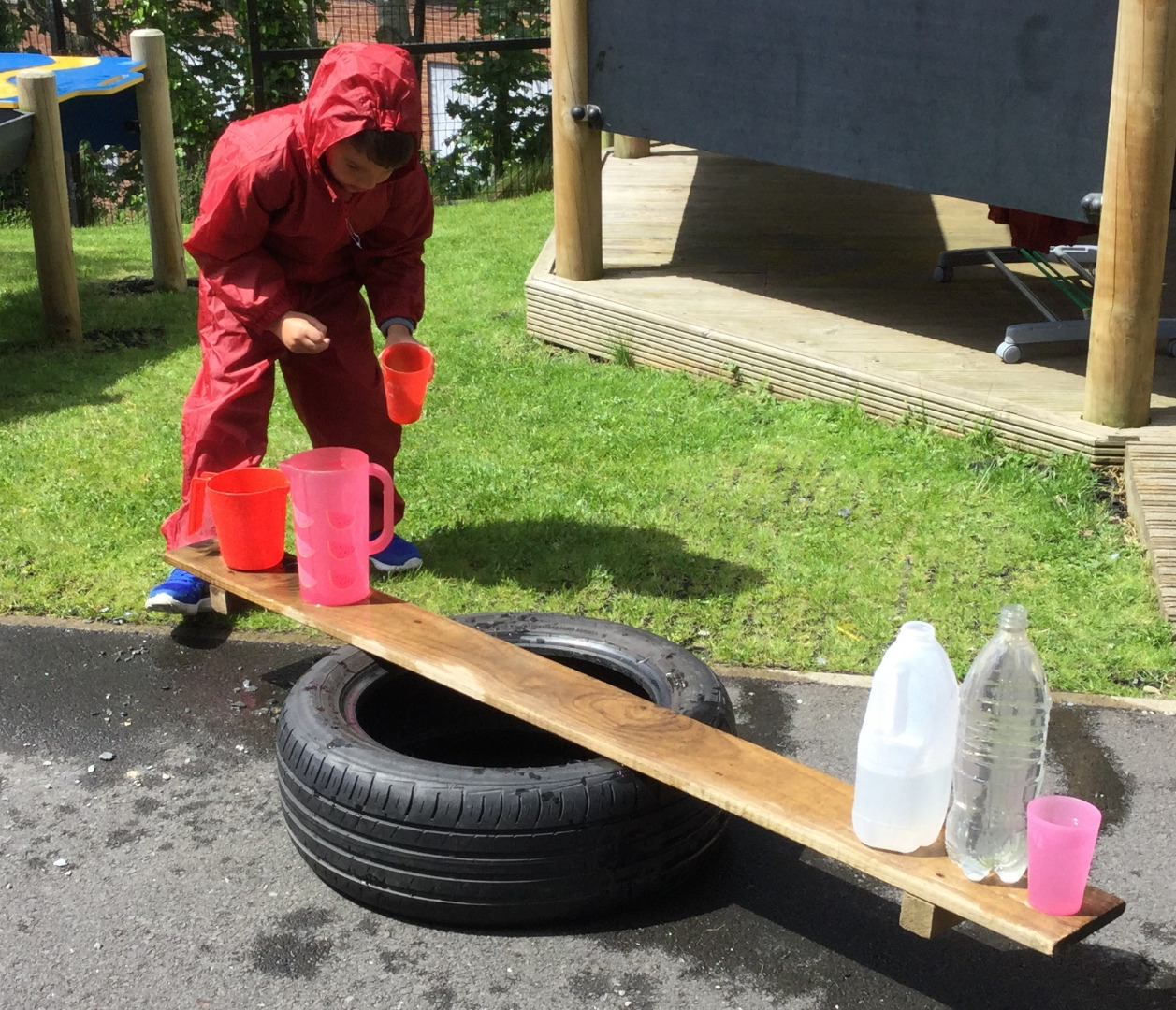
Opportunities to direct their own role play – set up their own shops, cafés, fast food restaurants and create their own pricing systems. Children will act out what they see happening in real life, so if we are all paying now by contactless methods then children will imitate this in their play. As adults, we need to tune in to this play, listen to what children are telling us they already know, and then provide props as and when necessary in order to support the role play and move the learning on to the next level. Here the children have set up their own Mc Donalds restaurant and have created a price list. An outdoor trolley with markers and whiteboards is avaialble to support children's writing and mathematical thinking in a natural way. The children are leading their own learning.
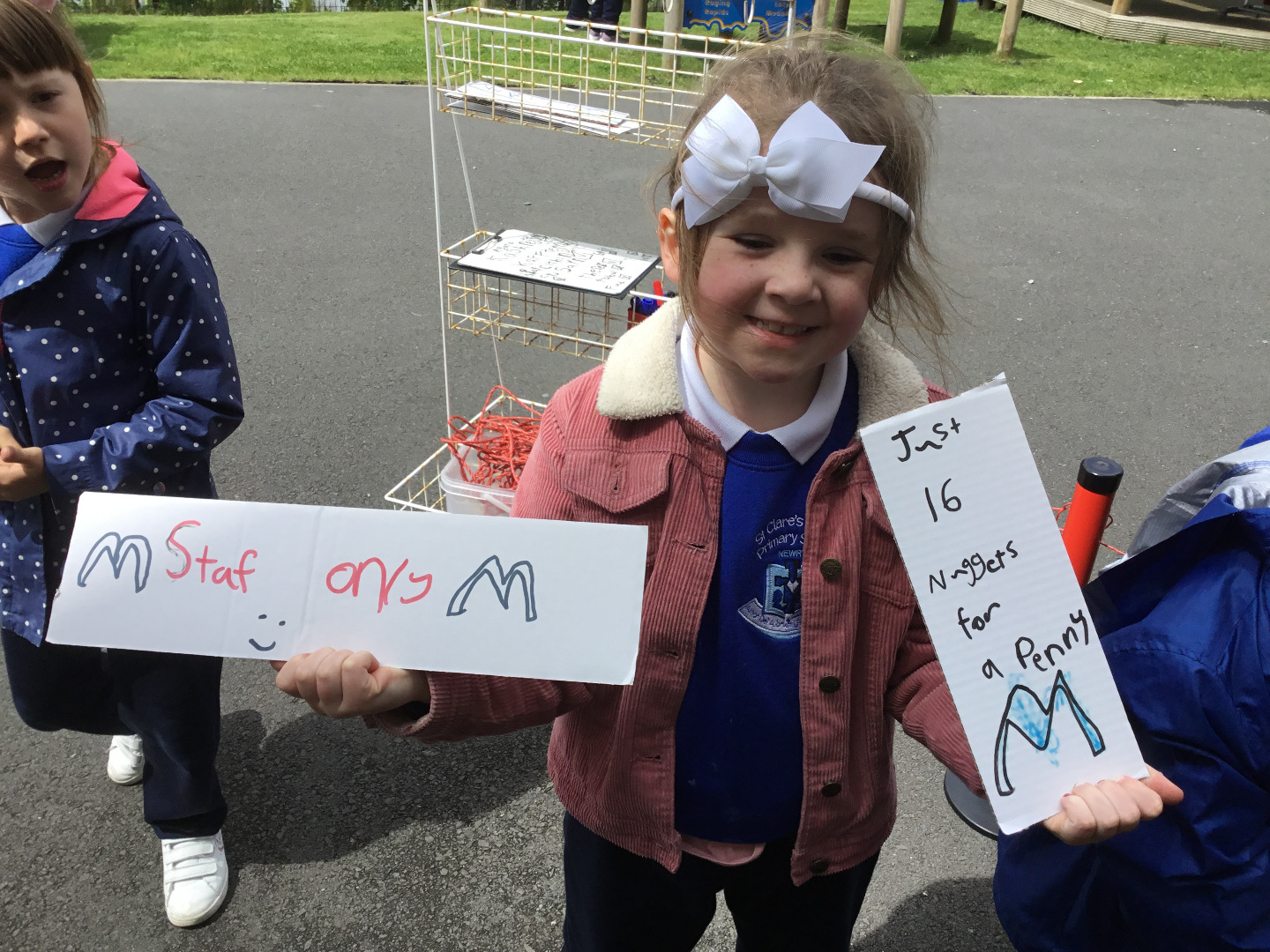
Measuring with standard and non-standard units – In the early years children are encouraged to measure objects using non standard units such as hands, feet, cubes, etc. However, we know that children love to copy adults and use real tools. They know that a measuring tape is for measuring things but they don’t really understand the measurements. Therefore, it is important that children have access to both standard and non standard units so that they can explore, play and learn. This 5 year old child is making a den and is measuring the space for a curtain string. She knows what the tape measure is for; she can read the numbers beyond 50; she just hasn't completely mastered the handling of the tape measure. She went on to measure her string and cut it to 54cm. The problem was that she did not have enough string to securely tie around the tree. And so the real problem arises! How much more string is required? That is real maths for a real purpose. And it is self directed by the children. The adult's role is to seize these wonderful teachable moments.
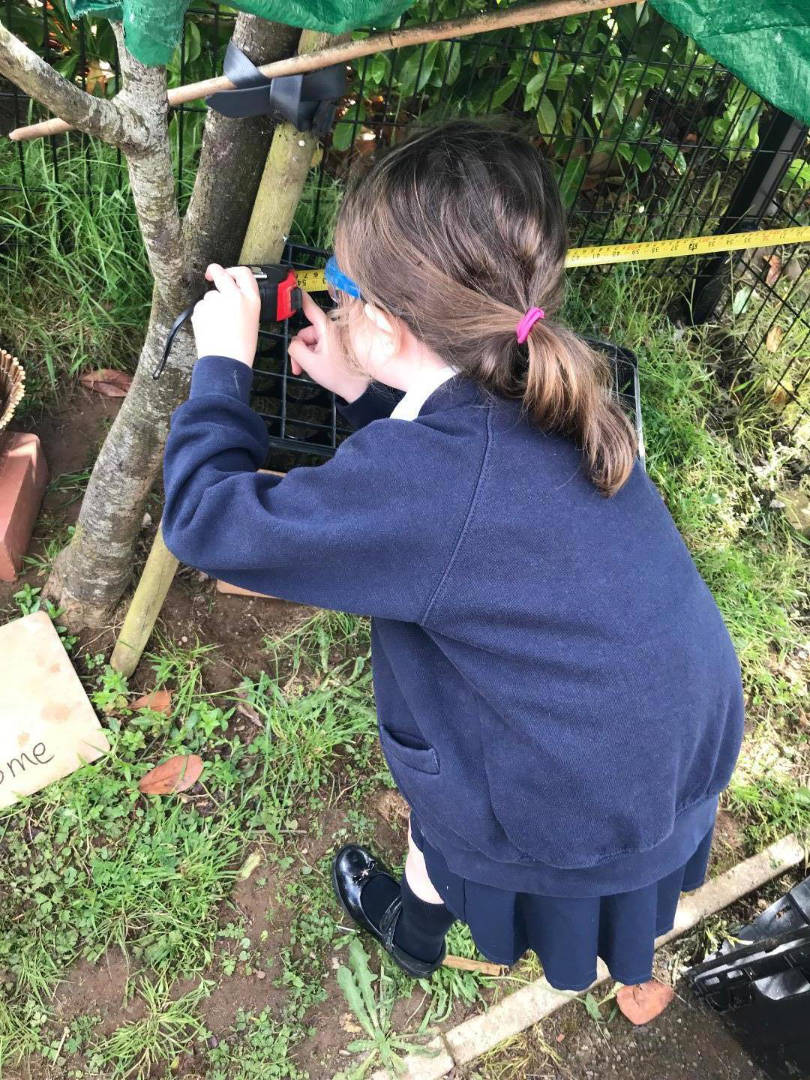
Building with large scale 3D shapes – gives children the freedom to really explore shape, size, measures, relationships and patterns. Measuring length, width and height of blocks is generally done by eye which helps to build up children’s ability to mentally visualise relationships. This is a practical skill that serves children well when they encounter more formal mathematics in later years. This child has spent the entire outdoor session working on this construction, paying attention to detail, ensuring symmetry, and also making sure that the enclosure is large and stable enough for him to climb into.
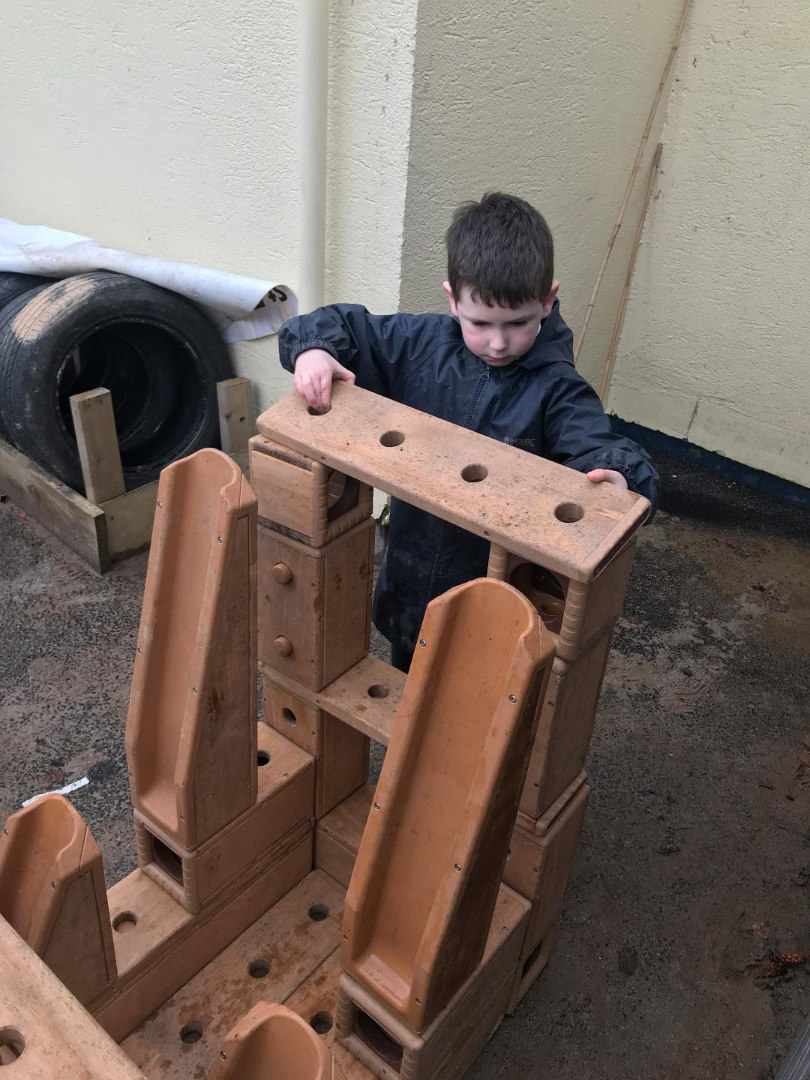
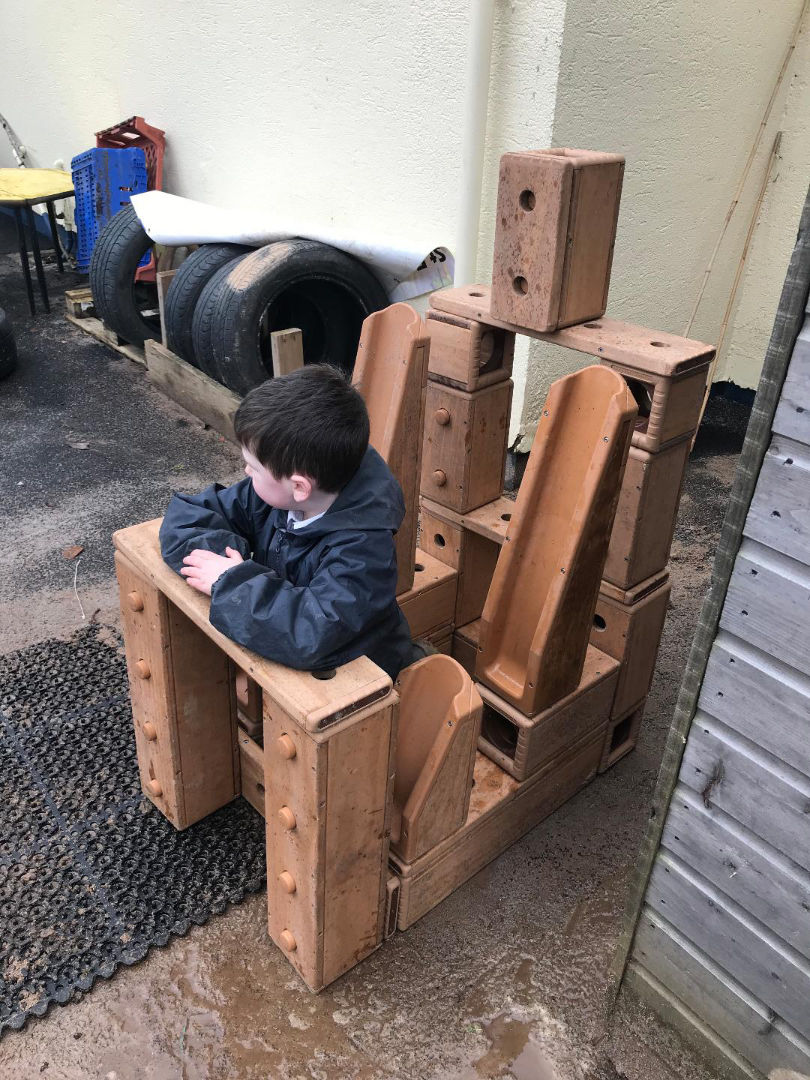
Remember !
Don’t be tempted to take indoor maths equipment outside, ie. the small stuff that is mostly for table tops. There is plenty of time for indoor maths. Being outdoors affords children the opportunity to experience maths on a larger scale. Children who struggle with the formalities of indoor learning often excel outdoors because they are more emotionally secure and ready to learn in an open relaxed space. Our job, as adults, is to be clear about what learning we want to promote, and then choose and locate the equipment intentionally. Watch the learning that happens naturally. You will see what children understand and misunderstand. Your observations will guide you towards the next steps on how to support and extend this learning.
It is not necessary to connect any of this learning to a topic. Just keep focused on the development of mathematical concepts in line with your monthly or six-week maths planning.
Please share this blog with parents and colleagues.
Online training on "Providing the Curriculum Outdoors" will be availble at the end of August 2020. Details to follow on Facebook.